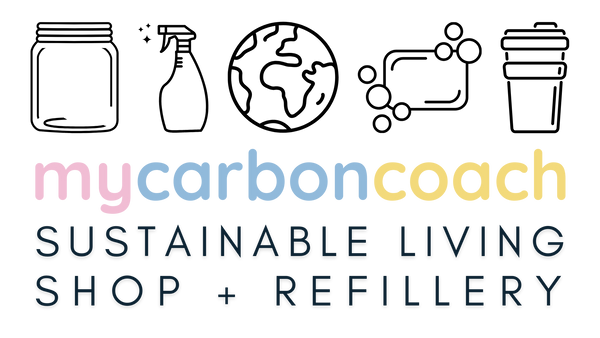
The Ultimate Guide to Sustainable Spring Cleaning
Share
Spring is the perfect time for a fresh start, and what better way to embrace the season than with a good spring clean? But traditional cleaning products often come with plastic packaging, harsh chemicals, and unnecessary waste.
This year, why not refresh your home the eco-friendly way? Sustainable spring cleaning is all about using natural ingredients, reducing plastic, and making choices that are better for your home, the planet and your bank account.
In this blog I’ll walk you through how to clean your home effectively using sustainable methods, simple swaps, and natural products that are kinder to the environment. Whether you’re tackling the kitchen, bathroom, bedroom, or even the garden, I’ve got you covered with the ultimate eco-friendly cleaning solutions.
1. Declutter responsibly
Before diving into any deep cleaning it’s always good to start with a thorough decluttering. Instead of simply throwing unwanted items away though, consider these sustainable options:
- Donate: Give clothes, books, and household items to charity shops or community groups.
- Sell: Use online platforms like Vinted or eBay to give unwanted items a second life. Alternatively for media or tech use CeX on most high streets in the UK.
- Recycle Properly: Check local recycling guidelines for electronics, textiles, and other household waste.
- Upcycle: Get creative with DIY projects to repurpose old furniture or clothing.
Decluttering doesn’t have to mean waste - by being mindful, you can ensure your unwanted items go to good use. If you have a lot to clear out, consider setting up a swap event with friends or your local community to give items a new home. Just google or search on your local Facebook group and there’ll more than likely be something happening.
2. Ditch harsh chemicals for natural cleaning solutions
Many conventional cleaning products contain harmful chemicals that can be irritating to both our health and the environment. Thankfully, natural cleaning alternatives are just as effective without the toxins. Some essential eco-friendly ingredients include:
- White vinegar: A powerful natural disinfectant and degreaser. (Available as a refill instore)
- Bicarbonate of soda: Great for scrubbing, deodorising, and tackling tough stains. (Available instore + online)
- Green bleach: An amazing stain remover and disinfectant. (Available instore + online)
- Castile soap: A plant-based soap that’s perfect for multiple cleaning purposes. (Refills hopefully coming soon!)
- Lemon juice: Naturally antibacterial and great for freshening up surfaces.
- Essential oils: Tea tree, lavender, and eucalyptus add a pleasant scent while boosting antibacterial properties.
DIY natural cleaning recipes
- All-Purpose Cleaner: Mix equal parts white vinegar and water in a spray bottle. Add a few drops of lemon or tea tree essential oil for fragrance.
- Scrubbing Paste: Combine bicarbonate of soda with a little water to form a paste, perfect for cleaning sinks, tiles, hobs and ovens.
- Glass Cleaner: Mix 1 cup of white vinegar with 1 cup of water and a splash of rubbing alcohol for streak-free shine.
- Carpet Freshener: Sprinkle bicarbonate of soda or borax substitute over carpets, let sit for 15 minutes, then vacuum up to remove odours.
You can find many of these ingredients available in the shop, allowing you to reduce waste while keeping your home clean.
3. Reduce plastic with reusable cleaning tools
Many conventional cleaning tools are made from plastic and end up in landfill once they wear out. Swap these for sustainable alternatives:
- Replace disposable wipes with washable cloths or compostable sponge cloths.
- Opt for wooden dish brushes with replaceable heads instead of plastic ones.
- Use refillable spray bottles instead of buying new plastic cleaning sprays each time.
- Ditch paper towels in favour of reusable fabric cloths or old cut-up t-shirts.
- Invest in a biodegradable loofah or natural fibre scrubbing brush to replace synthetic sponges.
Investing in reusable, plastic-free cleaning tools is an easy way to make a lasting sustainable change. Not only do they help reduce waste, but they also often last longer and perform better than their disposable counterparts without shedding microplastics around your home and down plugholes.
4. Freshen up your home naturally
Instead of synthetic fake air fresheners, which can contain harmful chemicals, try these natural alternatives:
- Simmer citrus peels and herbs in a pot of water for a refreshing scent.
- Use essential oil diffusers for long-lasting, non-toxic fragrance.
- Make your own room spray using water, a splash of vodka, and a few drops of your favourite essential oil.
- Place bowls of bicarbonate of soda around the home to absorb unwanted odours.
- Hang dried lavender or eucalyptus in your bathroom to add a natural fresh scent.
5. Make the most of refills
One of the simplest ways to cut down on waste while spring cleaning is to opt for refillable cleaning products. Instead of buying new plastic bottles every time, bring your empty bottles to my shop and refill them with:
- Multi-purpose cleaning sprays
- Washing-up liquid
- Laundry detergent
- Floor cleaner and much more
Refilling reduces plastic waste, saves money, and ensures you always have your favourite cleaning products on hand. Plus, if buying in bulk means fewer trips to the store, saving both time and carbon emissions.
6. Don’t forget your wardrobe!
Spring cleaning isn’t just about scrubbing surfaces, it’s also a great time to refresh your wardrobe sustainably:
- Wash clothes with eco-friendly detergent to keep them fresh while reducing chemical runoff.
- Store winter clothes properly using breathable fabric storage bags rather than plastic.
- Repair and mend any clothing items that need a little TLC rather than discarding them.
- Donate or swap clothes you no longer wear with friends or at a clothes swap event.
7. Sustainable outdoor spring cleaning
If you have outdoor space, extend your sustainable cleaning habits to the garden and patio:
- Use a natural weed killer (boiling water or vinegar work wonders!)
- Compost garden waste instead of sending it to landfill.
- Collect rainwater for watering plants to conserve water.
- Choose biodegradable outdoor furniture cleaner instead of chemical-heavy sprays.
Final thoughts: A cleaner home, a greener planet
Spring cleaning doesn’t have to mean waste or harmful chemicals. With a few small swaps, you can make your home fresher, healthier, and more sustainable. By choosing natural ingredients, reusable tools, and refillable products, you’ll be making a positive impact on both your living space and the planet.
If you’re looking for eco-friendly cleaning supplies, refills, and reusable tools, visit my shop in Taunton! I’d love to help you stock up on sustainable essentials for a greener spring clean.
